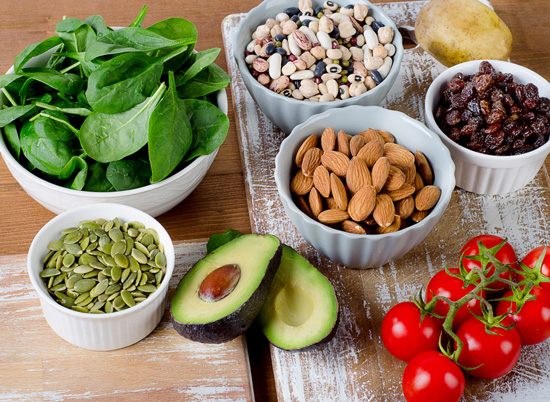About The Buzz: Eating Fruits and Veggies Helps to Lower Blood Pressure?

WHAT THEY’RE SAYING
New research shows that fruits and veggies have yet another health promoting benefit to add to a long list: fruits and veggies lower blood pressure. Lowering sodium (salt) intake has been the long-established gold standard method of lowering high blood pressure, but new evidence shows consuming fruits and veggies delivers even bigger benefits.1
WHY THIS MATTERS
High blood pressure, also known as hypertension, occurs when the force of blood (blood pressure) flowing through your blood vessels is consistently too high.2 Hypertension is extremely common, as one in three Americans over age 20 are hypertensive, and over one billion adults globally have high blood pressure.1,2 Hypertension has many causes, but is primarily caused by consuming foods that contain too much salt and fat, not consuming enough fruits and veggies, harmful levels of alcohol intake, little physical activity and a lack of exercise, and high levels of stress.3 Hypertension is a serious condition because it greatly increases the risk of other potentially fatal conditions, such as stroke and heart disease. The World Health Organization estimates that hypertension is the cause of approximately 51% of stroke deaths and 45% of deaths due to heart disease.3
The typical Western diet includes many processed food items and few fruits and vegetables. As more nations move towards development, traditional cuisines around the world have shifted from consisting primarily of fruits and veggies to including a large amount of processed foods. It is not surprising then, given this trend, that the over a billion adults around the world have high blood pressure. Processed foods contain little potassium and too much sodium, which leads to hypertension. Foods that contain some of the highest levels of potassium include fruits and veggies, such as sweet potatoes, various types of beans, spinach, bananas, baked potatoes and avocados.4
ABOUT THE RESEARCH
A study published in the April 2017 issue of the American Journal of Physiology — Endocrinology and Metabolism reviewed the influence of sodium, potassium and the sodium-potassium ratio on blood pressure. The review included research on both human and rodent models and demonstrated that potassium is protective against high sodium intake.
RESULTS OF THE RESEARCH
One study included in the review showed that raising dietary potassium effectively blunts the impact of high dietary sodium intake on blood pressure, especially in overweight and aging adults.1 Potassium helps to regulate blood pressure by enabling the body to excrete excess sodium through urine.5 The more potassium a person consumes, the more sodium is lost through urine.5 Overall, the authors conclude that limiting salt intake did not benefit blood pressure nearly as much as increasing potassium intake did.
OUR ADVICE
We are not advocating that you consume loads of processed foods comforted by the newfound knowledge that by eating potassium-rich foods you can neutralize the impact of a high-salt diet. Nearly two thirds of dietary sodium is added during the manufacturing process, meaning that salt is best avoided by limiting your intake of processed foods, such as canned soups, frozen meals, crackers, chips, savory snack mixes, among other highly processed foods.1 Table salt, or salt added to food after preparation, only accounts for about a third of a typical person’s daily sodium intake. As such, we recommend taking simple steps to limit sodium intake, such as making foods from scratch, cooking at home more often and adding more fresh foods to your diet. Including more fruits and vegetables in your diet will increase your daily potassium intake, which will benefit your blood pressure tremendously in the long run.
More Info
Pick Your Way to Stroke Prevention
How Potassium Can Help Control High Blood Pressure
Key Nutrients in Fruits & Vegetables
Fill Half Your Plate with Fruits & Veggies
Video Center: Selection. Storage. Preparation.
How Many Cups Do You Need?
Key Nutrients in Fruits & Vegetables
Fruit & Veggie Database


